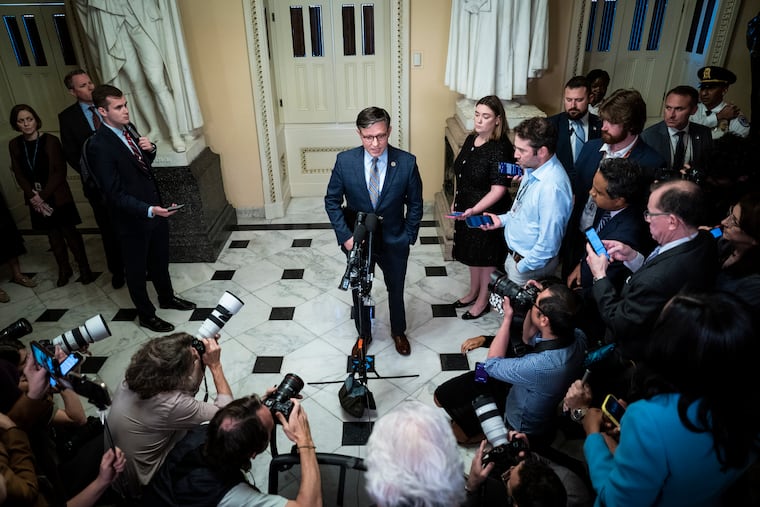A government shutdown could be imminent (again). Here’s what you need to know.
Here's when the federal government could shut down, and what that means for Philadelphia.

The U.S. government is a week away from a potential government shutdown, again.
All eyes are on new Republican House Speaker Mike Johnson, who is working to unite a polarized chamber — something his predecessor, Kevin McCarthy, struggled to do before being forced out of the post in October.
The last time Congress was in this position — at the end of September — an eleventh-hour proposal from McCarthy to extend program funds for 45 days earned enough support to stave off a government shutdown. The plan was approved less than three hours before a shutdown would have gone into effect.
Now, Johnson is working to propose a bill that would fund different portions of the government for different periods of time, but critics say the plan is too complex. Senate Democrats are reportedly also working on a bill, but it would need to get past the Republican-controlled House, where conservative lawmakers have said they want to cut spending.
If an agreement can’t be reached, a shutdown would begin Nov. 18. Here are the basics.
What is a government shutdown?
Traditionally, 12 annual appropriation bills outline funding for the various U.S. government agencies. Those bills are lumped together into a single “omnibus” package where they are approved in one vote.
The existing spending plans were set to expire Sept. 30, at the end of the government’s fiscal year. A last-minute stopgap measure was passed and extended funding through Nov. 17. Now that the new deadline approaches, if the appropriations bill isn’t passed and signed into law by then, funding for the new fiscal year wouldn’t be in effect, and the government could completely or partially shut down starting Nov. 18.
When a shutdown happens, the government isn’t able to spend money — with some exceptions — meaning that federal employees across the country are expected to work without pay until the shutdown ends or face furloughs. In turn, essential services will continue to operate, but resources will be significantly strained.
Who is affected by a government shutdown?
Hundreds of thousands of federal employees are impacted by government shutdowns. Those who are expected to work will not receive pay until after the shutdown has ended. The employees are guaranteed back pay. Many employees are also at risk of being furloughed and would not be allowed to work (but would also receive back pay thanks to legislation passed in 2019).
Some of the main groups of employees that could be impacted include members of active military, federal law enforcement, federal transportation workers (such as air traffic controllers and TSA agents, but not SEPTA), national park employees, scientific researchers, and some health-care providers.
When would the government shut down?
Congress and the Biden administration need to reach an agreement by the end of the federal fiscal year’s extended deadline, which is Nov. 17 at midnight. If they don’t, the shutdown would go into place on Nov. 18 at 12:01 a.m.
What was the longest government shutdown?
The longest, and most recent, government shutdown lasted 34 days, from Dec. 22, 2018, through Jan. 25, 2019. It was the second government shutdown to occur during Donald Trump’s presidency. That shutdown ended after East Coast airports faced major delays when unpaid air traffic controllers stopped coming to work.
What could a government shutdown mean for Philly?
In Philadelphia, the most recent government shutdown led to the closing of both Independence Hall and the Liberty Bell Center.
In September, the U.S. Department of Interior said that all National Park Service locations would close if a government shutdown went into effect, impacting Independence Hall, the Liberty Bell, and Valley Forge.
The city’s Immigration Court was closed, accepting only emergency filings for people already in detention.
Most federal Eastern Pennsylvania law enforcement officers continued to work without pay but some employees deemed nonessential were temporarily furloughed. Essential Philadelphia International Airport employees continued to work without pay, but resources were strained, with some air traffic controllers furloughed.
Workers at shelters that serve vulnerable populations and rely on federal funding worried about when payments would come.
What happens next?
House Republicans say they’re working on a bill. Senate Democrats are working on a stopgap bill of their own.
Things could get complicated if a continuing resolution aims to extend funding past Dec. 31. That’s because of the Fiscal Responsibility Act, which was passed last spring. The law says that if a continuing resolution is in effect for Jan. 1, the spending limit revises automatically with a cut to defense spending. That automatic revision would conflict with House Republicans’ efforts to increase defense spending.